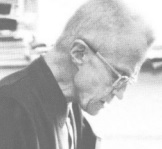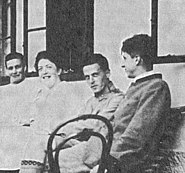Rush Rhees
Rush Rhees | |
|---|---|
 Rush Rhees, photographed by Michael Nedo | |
| Born | 19 March 1905 Rochester, New York, United States |
| Died | 22 May 1989 (aged 84) Swansea, Wales |
| Nationality | American |
| Spouse(s) | Jean Henderson Margaret 'Peg' Britton |
| Era | 20th-century |
| Region | Western philosophy |
| School | Analytic philosophy |
| Part of a series on |
| Ludwig Wittgenstein |
|---|
 |
Rush Rhees (/riːz/; 19 March 1905 – 22 May 1989) was an American philosopher. He is principally known as a student, friend, and literary executor of the philosopher Ludwig Wittgenstein. With G. E. M. Anscombe, he edited Wittgenstein's posthumous Philosophical Investigations (1953), a highly influential work. He was also responsible for publishing other works by Wittgenstein, including Remarks on the Foundations of Mathematics, Philosophische Bemerkungen, Philosophical Remarks, and Philosophical Grammar. Rhees taught philosophy at Swansea University from 1940 until 1966, when he took early retirement to devote more time to editing Wittgenstein's works.
Early life and studies[]
Rush Rhees was born on 19 March 1905 in Rochester, New York.[1] He was the son of Harriet Chapin née Seelye (the daughter of Laurenus Clark Seelye) and her husband Benjamin Rush Rhees, a Baptist minister, author and president of the University of Rochester[2] and, via the latter, the great-great-grandson of the radical Welsh-born preacher and pamphleteer Morgan John Rhys.[3]
Rhees began studying philosophy at Rochester, aged 16, in 1922. As a sophomore, he was expelled from his ethics class by Professor George M. Forbes, who had "found his questionings rude and insolent."[2] This controversy, which occurred in February 1924 while Rhees' father was out of the country, was reported on the front page of The New York Times.[4] Rhees would withdraw from the university soon after.[5] Rhees matriculated at the University of Edinburgh later that same year, graduating with a first-class honours degree in philosophy in 1928.[6] Rhees then acted as an assistant to J. L. Stocks at the University of Manchester and then studied with Alfred Kastil at the University of Innsbruck for a year.[6] In 1932 he became a research fellow at the University of Cambridge.[6] While at Cambridge, he impressed G. E. Moore, who described him as his ablest student,[7] and met Wittgenstein, who became a close friend. Wittgenstein continued to visit him after his move to Swansea in Wales.
Career[]

Rhees taught philosophy at Swansea University from 1940 to 1966. He has been known mainly as a Wittgenstein exegete and for his influence on his friends, colleague Peter Winch and former student and his literary executor D. Z. Phillips. He was responsible for editing but also developing the legacy left by Wittgenstein, at times emphasising religious and ethical understandings of Wittgenstein's work, reflecting how Wittgenstein himself sometimes said he wanted to be understood. Together with G. H. von Wright and G. E. M. Anscombe he was appointed by Wittgenstein as his literary executor. He was also Wittgenstein's personal executor.
Rhees was also influential in bringing the work of other philosophers to greater attention, notably for example the French philosopher, Simone Weil. For a time, he was visiting Professor at King's College London, and with Winch and Norman Malcolm formed a 'formidable triumvirate'[8] of Wittgensteinans.
Rhees returned to Swansea in 1982 after the death of his first wife Jean Henderson. In 1985 he would re-marry to artist and designer (Margaret) Peg Smythies, the widow of Wittgenstein disciple Yorick Smythies and the ex-wife of Barry Pink, a friend of Yorick's who had also been a friend to Wittgenstein during the last year of his life.[9][10]
At Swansea Rhees continued to teach, leading weekly post-graduate seminars from 1983 and, in the Cambridge tradition, welcoming a few students in 'at home' sessions for more detailed discussions of their research work. He also attended weekly meetings of the University's Philosophical Society that he had founded around 1940 (and which had counted Wittgenstein as chief amongst the eminent philosophers who addressed it in the years when Rhees was still a lecturer). It was also a forum in which students were expected to test and sharpen their philosophical wits. It was clear in these seminars that Rhees was not only devoted to exegesis of one of the finest thinkers of the twentieth century, but was, in fact, constantly absorbed in developing his own profound insights in Philosophy in repeated tours de force. He was self-effacing of his capacities and had to be persuaded to accept an honorary professorship at Swansea where he had previously turned down promotion during his teaching career.

In 1966 he took early retirement from the university to devote more time to editing Wittgenstein's works.[11]
Rhees died on 22 May 1989, and is buried at Oystermouth Cemetery in Mumbles near Swansea. His papers are held by Swansea University Archives.[6]
Major works[]
- Edited Studies in Logic and Probability (1952), a selection of works by George Boole
- Edited Philosophical Investigations (1953), by Wittgenstein
- Edited Ludwig Wittgenstein: Personal Recollections (1981)[12]
- Without Answers (1969)
- Rush Rhees On Religion and Philosophy (1997)
- Wittgenstein and the Possibility of Discourse (1998)
- Moral Questions (1999)
References[]
- ^ Phillips, D. Z. (2006), "Rhees, Rush", in Grayling, A.C; Goulder, Naomi; Pyle, Andrew (eds.), The Continuum Encyclopedia of British Philosophy, Continuum, doi:10.1093/acref/9780199754694.001.0001, hdl:11693/51028, ISBN 9780199754694, retrieved 2019-05-22
- ^ Jump up to: a b Phillips, D. Z. (2004). "Rhees, Rush (1905–1989), philosopher | Oxford Dictionary of National Biography". Oxford Dictionary of National Biography (online ed.). Oxford University Press. doi:10.1093/ref:odnb/65652. Retrieved 2019-05-13. (Subscription or UK public library membership required.)
- ^ Phillips, D.Z. (1989-06-18). "Introduction: Attention to Particulars". Wittgenstein: Attention to Particulars Essays in honour of Rush Rhees (1905–89). (ed.) Phillips, D. Z., Winch, Peter. London. pp. 10–11. ISBN 9781349111978. OCLC 1086447594.
Rush Rhees had a distinguished ancestry. His great-great-grand-father, Morgan John Rhys, Baptist preacher and radical pamphleteer, fled from Wales to America in 1794 during the unrest which followed the French Revolution. Benjamin Rush, a signatory of the Declaration of Independence, helped him to form a Welsh colony in the Alleghenies. Morgan John Rhees (the spelling of the surname had changed) named his second son Benjamin Rush Rhees. Rhees' father was also named Benjamin Rush Rhees, but dropped the 'Benjamin'. He was an outstanding president of Rochester University, to whom the Rush Rhees Library stands as a tribute. Rhees' father's achievements and family background are recorded in 'Rhees of Rochester' by John Rothwell Slater.
- ^ "Radicalism of Rochester President's Son Causes Professor to Bar Youth From Class". The New York Times. 1924-02-28. ISSN 0362-4331. Retrieved 2019-05-22.
The 'advanced ideas' of Rush Rhees Jr., son of the President of the University of Rochester., have caused him to be barred from the second semester of his ethics class at the university. His ideas are said to have conflicted with those of Dr. G. M. Forbes, head of the philosophy department. ... 'The most unsatisfactory notebook for the year's work I have ever had turned in to me,' Dr. Forbes told his class of seventy-five students referring to young Rhees's work. 'It attempted refutation of everything I had taught during the year.' Young Rhees said ...'I am a radical. Dr. Forbes is not. That is why I am barred from the course,' the student said. … 'Seemingly he does not want any one to formulate ideas which do not accord with his own.'
- ^ "When Rush Rhees' son dropped out". Campus Times. 2016-03-24. Retrieved 2019-05-22.
The elder Rhees’ biographer is wholly silent on the President’s reaction to the nationally publicized controversy stirred up by his son back in Rochester. ... Rhees, Jr. withdrew from the University shortly after this incident, and he left for Scotland prior to his father’s return home. Rhees, Jr. completed his undergraduate education at the University of Edinburgh in Scotland...
- ^ Jump up to: a b c d "Rush Rhees Collection - Archives Hub". archiveshub.jisc.ac.uk. Retrieved 2019-05-13.
- ^ see the biographical sketch by D Z Phillips in Rhees' On Religion and Philosophy, 1997
- ^ Colin Lyas, "Peter Winch", Acumen Press, 1999, p. 4
- ^ "About". Peg Smythies. Retrieved 2019-05-29.
- ^ Hayes, John (2018). "Wittgenstein's Irish Cottage". History Ireland. 26 (4): 36–38. ISSN 0791-8224. JSTOR 26565897.
- ^ Rhees, Rush. (2004). "Acknowledgments". In Dialogue with the Greeks: Volume I: The Presocratics and Reality. Phillips, D. Z. (Dewi Zephaniah). Aldershot, Hants, England: Ashgate. ISBN 0754639886. OCLC 53469916.
- ^ Malcolm, Norman (1981-11-19). "Wittgenstein's Confessions". London Review of Books. pp. 16–18. ISSN 0260-9592. Archived from the original on 2017-07-05. Retrieved 2019-05-28.
- Analytic philosophers
- Wittgensteinian philosophers
- University of Rochester alumni
- 1905 births
- 1989 deaths
- Academics of Swansea University
- People from Rochester, New York
- Alumni of the University of Edinburgh
- American philosophers
- American emigrants to the United Kingdom
- British philosophers
- 20th-century historians
- British people of American descent
- American expatriates in Scotland